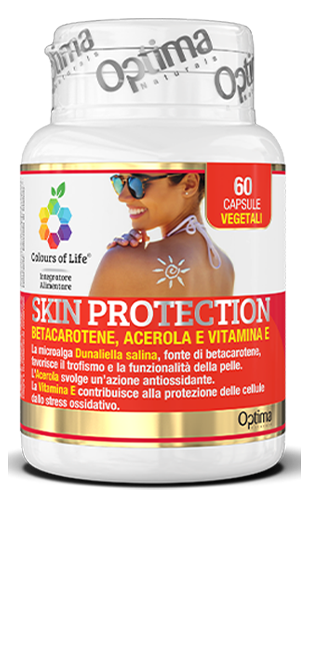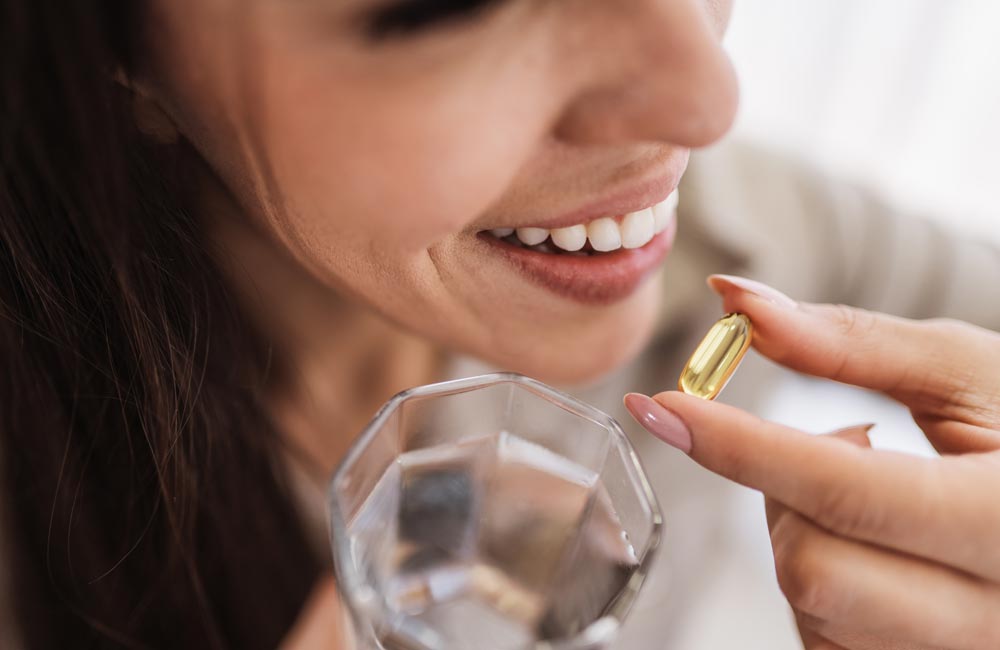BLOG
Beta-carotene: antioxidant for a young and tanned skin

What is beta-carotene
Beta-carotene is a substance found in vegetables, plants and algae, which gives them a vivid yellow, orange and red colour. It is the most widely occurring carotenoid in nature and is the precursor of vitamin A (retinol), a vitamin that is important for maintaining healthy skin, bone development and efficient vision. Once taken, the body converts beta carotene into vitamin A.
What are carotenoids
Carotenoids are natural pigments found in most fruits and vegetables, plants, algae and photosynthetic bacteria.
The human body is unable to synthesise carotenoids, which is why they have to be ingested through food or supplements.
Carotenoids perform various functions for human health, but mainly exert an important antioxidant action.
The authoritative site PubMed (1) reports that 'there is evidence that carotenoids, in addition to their beneficial effects on eye health, also produce improvements in cognitive function and cardiovascular health and appear to help prevent certain types of cancer'.
What beta carotene is good for
Research suggests that antioxidants, including beta carotene, can help keep the skin healthy and protect it from the sun's UV rays.
Beta-carotene, like all carotenoids, is fat-soluble and sensitive to light and heat.
The absorption rate of beta-carotene through the diet is very low, less than 50%, and it is not toxic, unlike vitamin A which can have side effects if taken in high doses.
Skin and beta-carotene
The presence of adequate levels of beta carotene in the body reduces the skin's sensitivity to sunlight.
The presence of beta carotene in the body can:
- reduce the risk of sunburn, a very attractive property for people with a very fair complexion who are sensitive to sunburn;
- protect the skin from sunburn thanks to its antioxidant activity;
- protect against sunburn by reducing the effects of photo-ageing, a skin ageing phenomenon that causes changes in elastic tissue, collagen and the dermis induced by UV rays.
Foods rich in beta carotene
Many commonly used fruits and vegetables are rich in this important substance, such as yellow-orange fruits and vegetables like carrots, pumpkin, melon, apricots, peaches. Also, green leafy vegetables such as spinach, lettuce, broccoli, turnips.
Being a fat-soluble molecule, it is ideal to accompany these foods with a source of fat such as extra virgin olive oil or dried fruit. Another aspect to consider is that, unlike many vitamins, the bioavailability of beta carotene increases after cooking food.
The microalgae Dunaliella salina
Beta-carotene is also contained in the single-celled microalgae Dunaliella salina, which is the richest natural source of beta-carotene. Beta-carotene extracted from this alga, when used in the formulation of food supplements, has a higher bioavailability than the synthetically produced beta-carotene that makes up the majority of the marketed beta-carotene (5).
As well as having a general protective effect on the skin, this micro-algae is able to prevent ageing caused by the sun's rays.
Synergy with vitamins and minerals
There are two vitamins that can act as antioxidants and free radical scavengers in synergy with beta-carotene: vitamin C and vitamin E, both of which have known antioxidant properties. In particular, Vitamin E performs an effective antioxidant action and helps protect cells from oxidative stress, thus acting, together with Vitamin C, against free radicals.
Free radicals are responsible for cellular ageing, a process that is accelerated by exposure of the skin to sunlight. The benefits of beta-carotene therefore increase if these two important vitamins are taken at the same time.
BIBLIOGRAPHIC REFERENCES:
- Manfred Eggersdorfer 1, Adrian Wyss 2, Carotenoids in human nutrition and health, PubMed
- Wilhelm Stahl 1, Helmut Sies, β-Carotene and other carotenoids in protection from sunlight, PubMed
- Wilhelm Stahl, Helmut Sies, β-Carotene and other carotenoids in protection from sunlight, The American Journal of Clinical Nutrition,
- S A Paiva, R M Russell, Beta-carotene and other carotenoids as antioxidants, PubMed
- ScienceDirect, Dunaliella salina
This article is for information only and should not replace medical advice. Please consult a doctor or health care professional before trying any remedy.
The advice is for information only and should not replace medical assistance. Please consult a doctor or health care professional before trying any remedies.
SKIN PROTECTION









 Optima Naturals S.r.l. ® Via Sempione 124, 21029 Vergiate (VA)
Optima Naturals S.r.l. ® Via Sempione 124, 21029 Vergiate (VA)